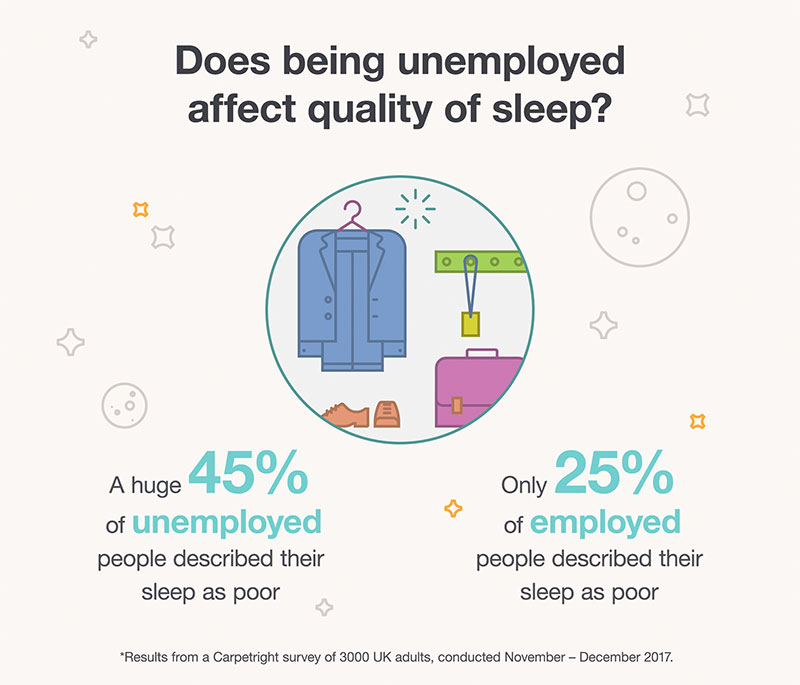Is work affecting your sleep?
The human brain is complex and acute. Where you work, when you work and even how you work, can all have a major impact on the quality of sleep you’re getting.

A reason to get out of bed
Some people think the unemployed have an easier life, but you only have to look at our statistics to see that’s simply not the case. As Employment Plus points out: “Almost everyone who’s unemployed will experience stress to some degree. It may manifest as trouble sleeping, a lack of appetite, headaches and persistent feelings of not being able to cope.”1
Such stress can lead to inactivity, social isolation and a lack of motivation, which may trigger mental health issues. This could explain why nearly 6 in 10 unemployed young people say that anxiety has stopped them from sleeping well.2
Having somewhere to be every day gives us a reason to get out of bed in the morning. This generates a regular sleep rhythm, feeling of purpose and sense of responsibility. That, in itself, can often be what it takes to get back on track.
Nature is the best medicine
Forget sleeping pills — nature is the new narcotic. Our results show that people working closely with nature (in environment and agriculture professions) get the best night’s sleep by a long way — and there’s a mass of scientific research to back this up.
A study, conducted by Kenneth Wright from the University of Colorado, found that increased exposure to natural sunlight helps reset your body clock and improve quality of sleep. Wright also found that those who spend more time indoors can notice a negative effect on their sleep. Exposure to electrical lighting and the constructed environment (nearly all offices) “contribute[s] to late sleep schedules and may disrupt sleep and circadian clocks.”3
Unfortunately, there is less opportunity for us to work amongst nature these days. But this research goes to show the importance of squeezing some quality time outdoors into your schedule.
Better salary, better sleep?
The other industries that came out top for sleep quality are all well-known for their healthy pay packages. But does healthy pay mean healthy sleep?
The Independent claims that “the best paid jobs are senior or technical roles.”4 Engineering, management and electronics have been named as some of the highest paying sectors,5 whilst finance, insurance and energy are well established as industries with the richest top earners.6
It’s likely that most of these employees benefit from a stable career and financial security, which removes the UK’s number one cause of stress from their psyche.7 But can money really buy a better night’s sleep?
Shift work: the silent killer
Although the industries that scored lowest on quality of sleep are predominantly low income jobs, there may well be more to this than money.
Aside from marketing and advertising, these careers all involve caring for people, which can be highly stressful and demanding. Nurses, firefighters, carers, and hotel staff also often work night shifts and long, irregular hours, which can be detrimental to sleep quality.
A study of police officers by the University of Iowa found that working the night or evening shift was strongly associated with getting fewer than six hours of sleep per day. This more than doubled the risk of bad quality sleep which, in turn, can lead to serious health problems.8
1www.employmentplus.com.au/job-seekers/tips/dealing-with-stress/
2www.theguardian.com/society/2015/jan/14/more-than-half-unemployed-young-people-anxious-about-life-report
3www.gwern.net/docs/melatonin/2013-wright.pdf
4www.independent.co.uk/news/business/news/the-30-best-and-worst-paid-jobs-in-the-uk-a6740731.html
5www.cv-library.co.uk/career-advice/development/best-salaries-2016
6www.cityam.com/269328/revealed-industries-richest-top-earners
7www.ymca.co.uk/health-and-wellbeing/feature/financial-concerns-biggest-cause-stress-uk-adults
8www.huffingtonpost.co.uk/entry/how-working-night-shifts-affects-health_uk_57207e60e4b0a1e971caab31














